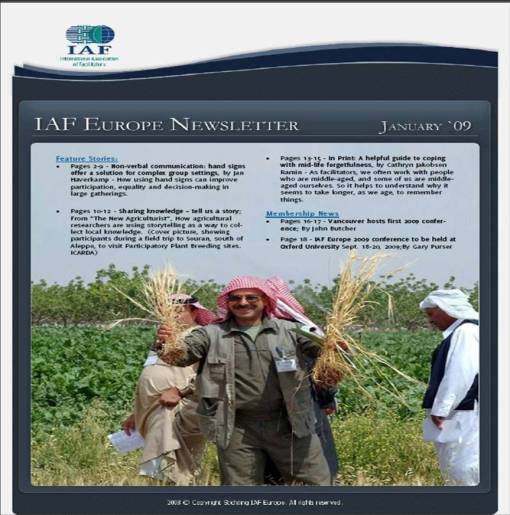The latest newsletter of GFAR features an article about the ICT-KM Program’s Knowledge Sharing in Research project and its Pilot Projects. See links and article below.
See: GFAR Newsletter
See: article on KSinR project and Pilots
The CGIAR: learning how to improve its research effectiveness and impact through knowledge sharing
The CGIAR Centres and Programs together with their many partners, are creating a wealth of knowledge that is aimed at helping to increase productivity within agriculture and improve livelihoods of people, primarily in developing countries. While all players are doing much to ensure that this knowledge is widely shared and applied, certain obstacles to the uptake, use and impact of this wealth of knowledge continue to exist. One of the missing elements between knowledge generation and the application of such knowledge is knowledge sharing. Knowledge sharing involves learning from stakeholders what knowledge gaps exist and what is needed to close these gaps; increasing collaboration and interaction of all actors throughout knowledge generation processes; and finding more effective ways of delivering knowledge in a manner appropriate to the particular target groups whose decision-making and actions we seek to influence and support. This requires better understanding and support of new knowledge systems, knowledge sharing approaches, and innovation mechanisms.
To address this, the CGIAR through its system-wide program on Information Communication Technology and Knowledge Management (ICT-KM) initiated a two-year project starting in 2007 entitled ‘Improving the effectiveness of the CGIAR through knowledge sharing’ with a major component focused on Knowledge Sharing in Research (KSinR). The goal of the KSinR Project is to help improve the effectiveness and impact of CGIAR research through providing options and lessons around good practices of knowledge sharing in research.
KSinR’s main learning vehicle is six on-going CGIAR research projects which are using knowledge sharing approaches integrated into various stages of the research process, representing a new way of doing research aimed at greater impact. This includes the use of a multi-stakeholder framework for conducting research as being tried by IWMI through its use of the Learning Alliance approach in the ‘Wastewater , Agriculture and Sanitation for Poverty alleviation’ (WASPA) project aimed at improving coordination amongst stakeholders and getting research into use. This project is also developing a process mentoring method to monitor and evaluate the effectiveness of the Learning Alliance approach. The ICARDA Farmers’ Conference project is providing lessons on mechanisms for sharing knowledge with and learning from farmers to help with better design and carrying out of plant breeding research. The CIFOR Pilot is exploring better ways to share research priority assessment methodologies and the experiences around using them, as this is an important tool in figuring out those areas and types of research which can provide the greatest impact. The IWMI Wastewater project is testing various dissemination methods to improve uptake and use of research results.
This includes use of radio programs, training videos, contribution to curricula, and flip charts with printed messages and visuals to get across good practices in using wastewater.
Similarly the IRRI-lead Pilot is also exploring innovative dissemination methods through the development of the Laos Rice Knowledge Bank (LRKB) as a mechanism to make research accessible for extension agents to use with farmers.
Information packets based on research identified by a variety of stakeholders are being developed in appropriate formats to be included in the LRKB. The WorldFish Centre Pilot Project is also trying out participatory monitoring and evaluation, as well as impact assessment methodologies with the aim of learning together with stakeholders throughout the research process, and gaining their perspective on progress and impact.
Synthesis of the results across KSinR and all of its Pilot Projects and other activities will be documented in a variety of media including the KS website (www.ks-cgiar.org), the KSinR blog, and through the development of practical how-to documents to be made widely available and presented at upcoming CGIAR and other fora.
Nadia Manning-Thomas, KSinR Project Leader, n.manning@cgiar.org
IWMI Nile Basin and East Africa office, ILRI Campus, Addis Ababa, Ethiopia


 trip to Souran, south of Aleppo, to visit Participatory Plant Breeding sites (Credit: ICARDA)
trip to Souran, south of Aleppo, to visit Participatory Plant Breeding sites (Credit: ICARDA)







